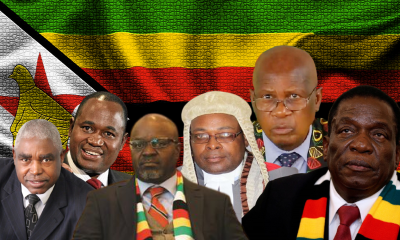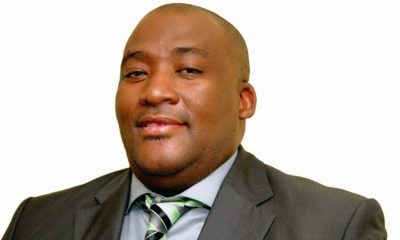Politics
CONNECTIONS2COMMUNITIES (C2C) TOWARDS LEADERSHIP LITEARCY – THE MALAWI CASE STUDY
Published
4 years agoon

It is self-evident that rarely does a shared understanding exist as to what is and should be the duties of citizenship let alone what the role of a President in a constitutional democracy is and should be.
So in 2003, when the idea of setting up a member-based association under the name Africa Heritage Society (AHS), I was one of the first voluntary subscribers in the hope that I would be part of a community of thinkers and doers to help shape and define the personality and character of the African I want.
What divides us pales in comparison to the promise of destiny shaped by our shared heritage.
Only yesterday, I had a conversation on the question of what leadership is and is not in relation to one of the initiatives under the name “Converting Connections to Communities (C2C).” that I am part of.
I got an approach from a friend who was referred to me to explain what C2C was. The person who referred this friend to me did so in good faith as he felt that I would be more competent to download the idea behind this initiative having been the person who came up with the idea.
Instead of just sharing my thoughts, I chose to respond in a long winding manner because it is often the case that the idea generator is expected to be the owner of the idea and as such must lead it to harvest.
I believe that humanity is indivisible, and we are all created equal allowing no one to be a leader or a genius in defining what is yet to happen.
Using this perspective, human beings cannot be divided into distinct identities of leaders and followers.
A so-called leader is just another mortal and fallible individual who is incapable to lead others to where he would not have been.
We all live life in the present leaving no one with extra time to lead sovereign human beings yet the reality is that the expectation of a few rising above the limitations imposed on all of us to lead or pretend to lead is real and alive.
There are too many people who see leadership or lack of it as an enduring problem to progress simply because the expectation is that for one to be a President, he or she must possess some properties to see and envision what is yet to happen and list others to join the highway to the promise.
The history of human civilization has no facts to support the notion that a leader, being a human being, can escape the limitations imposed on all of us simply on account of assuming what should be a defined administrative role, to become this imaginary BIG PERSON who must know better and act in the best interests of all.
Active citizenship absent literacy on leadership, government, civics, citizenship, and accountability produces distortions and diversions that undermine bridge building among divided people and promotes the building of walls.
Human beings are diverse and therein must lie the promise of complimentarily and mutuality yet all too often diversity is weaponized to deliver sub-optimal outcomes.
But where is wisdom to be found on what the promise of a President in a constitutional democracy is and should be when the people who assume these positions and their competitors behave as if being a President clothes one with unique skills and competencies.
Below is what is shared in a WhatsApp group: “Towards Media Excellence,” that I am part of. Please read it and share your thoughts as a way of provoking, inspiring and igniting conversations on what needs to happen to best deliver the promise that life should and must offer to all.
“The President of Malawi, Lazarus Chakwera, has a weekly radio address in which he updates citizens on progress made and sets down the tone and direction of his leadership. Last Saturday’s address was perhaps the most interesting yet.
This, in part, is what he said:
Fellow Malawians,
I have noted with delight that there is much interest in my plans to trim the powers of the president. Because of that interest, I am confident that when this project is well underway, it will have your full support.
Reducing presidential powers is something that is often promised but never delivered, but I think you know by now that I do not say something unless I mean to do it. But to get this done, I need your support.
But it is important that we all understand what these powers are.
The first category of powers a president has is positional. In our jurisdiction, there are certain positions and offices that are reserved for the president alone, such as the positions of Head of State, Head of Government, and Commander-in-Chief of the Armed Forces.
It is time we reviewed the merits of having the president also occupy an office like the Chancellor of the public University. This is a relic from a bygone era. I know of no free country in which the State President is at helm of an institution that exists to produce free thinkers
Second category has to do with certain decisions that are reserved for a president to make. It’s my view that there are too many decisions made by a president, so I mean to reduce that. Having a president make too many decisions has created problems for our country for a long time
There must be decisions that when made by Parliament are final, and even where the President has the power to veto such decisions, he should no longer be allowed to sabotage the governance framework by sitting on the decision.
The third category of powers a president has is that of appointments. From the Judiciary, to the Legislature, to the Executive, all the way to constitutionally mandated institutions designed to operate independently, the boards of statutory corporations, foreign embassies…
we have the anomaly of having all of them look to the president as the appointing authority. This is unwise.
No person is good or humble enough to be entrusted with that much appointing power.
The fourth category of presidential powers which need trimming is cultural. We need to review our behaviors towards a president, because how we behave around a president is what creates a national perception of how much power he or she has…
This includes how we address a president, how many times a president is mentioned in salutations at a single event, how many cars and firepower a president’s convoy has, and so forth…
During the campaign for presidential elections, I noted that many political campaigns conducted by state officials were using state resources like state vehicles & state security. We need to think about the limits and parameters of this culture because it is now regularly abused
Even if it may not be possible to fully separate state resources from the activities of political parties, we need rules that clearly spell out when the overlap between party and state is acceptable and when it is abusive.
When I propose laws to address these inconsistencies, I ask you to support me by demanding that your MPs vote for these changes. Malawi needs a more empowered citizenry. The way to achieve that is to increase the powers of governance institutions & decrease powers of the president
~ENDS.
Now, should Chakwera live up to his word, he will set Malawi on a very different trajectory of active citizenship, accountability in leadership and a healthy relationship between the people and their president.”
Experienced Chairman with a demonstrated history of working in the information technology and services industry. Strong entrepreneurship professional skilled in Negotiation, Budgeting, Business Planning, Operations Management, and Analytical Skills.











Warning: Undefined variable $user_ID in /home/iniafrica/public_html/wp-content/themes/zox-news/comments.php on line 49
You must be logged in to post a comment Login